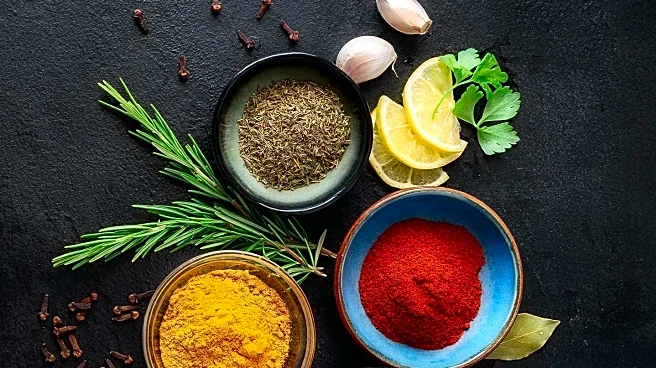What's Happening?
A recent study conducted by a team from South Korea has identified common kitchen spices that may help prevent dementia and heart disease. The research highlights spices such as saffron, cumin, and cardamom, which contain compounds that target dysfunctional proteins associated with Alzheimer's and cardiovascular diseases. These proteins are linked to inflammation and cell survival processes, which, when disrupted, increase the risk of these diseases. The study, published in the journal Computers in Biology and Medicine, utilized computer simulations to explore how these spices interact with key genes involved in both Alzheimer's and heart disease. The findings suggest that these spices can help protect brain connections and reduce inflammation, offering a natural approach to disease prevention.
Why It's Important?
The significance of this research lies in its potential impact on public health, particularly as the U.S. faces an aging population and rising rates of Alzheimer's disease. With heart disease being the leading cause of death in the country, the discovery of natural, accessible methods to combat these conditions could have substantial implications. The use of everyday spices as a preventive measure offers a cost-effective and widely available option for individuals seeking to improve their health. This approach could reduce healthcare costs and improve quality of life for millions, especially as Alzheimer's cases are projected to increase significantly in the coming decades.
What's Next?
Further research and clinical trials are likely needed to confirm the efficacy of these spices in preventing dementia and heart disease in humans. If successful, these findings could lead to new dietary recommendations and public health strategies aimed at reducing the incidence of these diseases. Additionally, the food and health industries may explore the development of supplements or fortified foods that incorporate these beneficial compounds. Public awareness campaigns could also play a role in educating individuals about the potential health benefits of incorporating these spices into their diets.
Beyond the Headlines
This research highlights the interconnectedness of brain and heart health, emphasizing the importance of a holistic approach to disease prevention. The study also underscores the potential of traditional and natural remedies in modern medicine, bridging the gap between ancient practices and contemporary scientific research. As the healthcare industry continues to seek sustainable and effective solutions, the role of diet and natural compounds in disease prevention may gain increased attention and validation.










